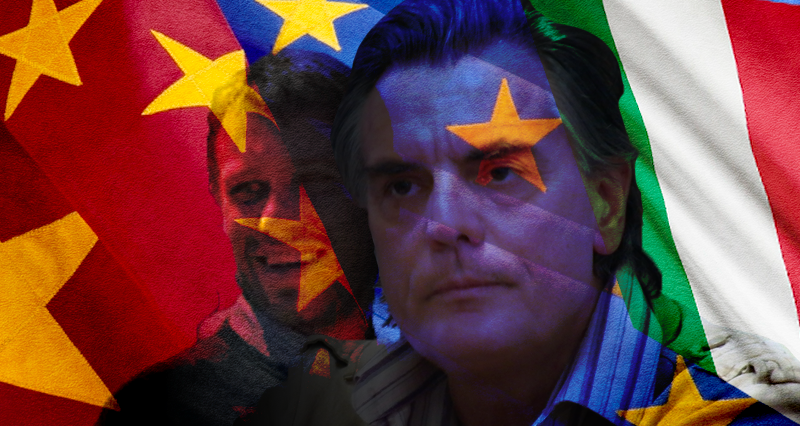On his return from his mission in Moscow where he met various Russian leaders including Sergey Lavrov, the High Representative for Foreign Affairs of the European Union, the Spaniard Josep Borrell, found a welcome that was anything but positive. The Iberian diplomat was swamped with criticism because his behavior was not aggressive enough towards Russia. Estonian MEP from the European People’s Party (EPP), Riho Terras, sent a letter to the President of the European Commission, Ursula von der Leyen, asking for Borrell’s resignation. The letter found the adhesion of 81 MEPs. On Twitter, Terras thanked his colleagues for their participation and explained that the letter stems from the outcome of Borrell’s mission to Moscow during which, according to the Estonian deputy, the High Representative “caused serious damage to the reputation of the EU and the dignity of his office”. The letter asks von der Leyen to intervene if Borrell does not resign on his own initiative.
The story helps us to understand the growing level of russophobia in Brussels. A sentiment certainly dictated by the new US administration which has decided to return to apply the maximum pressure possible on Russia. Just as the tough US confrontation with China continues. With respect to the Trump management, perhaps the tone has changed, perhaps now more moderate, but the substance is the same. The recent WHO mission to Wuhan to investigate the origins of the new coronavirus turned by Washington into a sort of inquisition against China demonstrates the unchanged US posture.
Inevitably, Washington’s positions end up reverberating on the European bloc. We must bear in mind that the political and commercial relations of the European Union have traditionally been marked by a strong Atlantic orientation. It is a balance born at the time of US support for reconstruction provided to European governments after World War II, through the European Recovery Program (Marshall Plan) and consolidated in the context of political-institutional cooperation implemented through NATO and participation in international multilateral institutions – like the World Bank and the International Monetary Fund – created within the so-called international liberal order born with the Bretton Woods agreements of 1944. Adherence to the international liberal order entailed adherence to the principles and rules of liberal democracy; the acceptance of the market economy as the ordering principle of the economic life of society. Euro-Atlantic relations have developed within this political order, which has always seen the United States as guardians of the stability of the order itself and, in many cases, protagonists of its evolution or expansion.
Although these factors strongly influence and limit the relations of the European Union with the Eurasian powers, the ties, also and above all for economic reasons, have never been interrupted. The relationship between the union and Russia is at a minimum but there is resistance to the hypothesis of new sanctions against Moscow. Germany would be reluctant. Furthermore, Berlin has no intention of giving up the North Stream project. On the other hand, relations and business with China are even growing.
China is now the EU’s biggest trading partner, overtaking the US in 2020.
“In the year 2020, China was the main partner for the EU. This result was due to an increase of imports (+5.6%) and exports (+2.2%),” according to Eurostat, the EU’s statistical office.
The figures were similar to China’s official data published in January, which showed trade with the EU grew by 5.3% to $696.4bn in 2020.
The EU’s trade deficit with China also grew from $199bn to $219bn according to Eurostat figures.
But there’s more: on 30 December 2020, after seven years of negotiations, the EU and the Government of the People’s Republic of China signed the Comprehensive Agreement on Investments (CAI), an impressive agreement of strategic importance. An understanding that will influence Euro-Atlantic relations and the future of global multilateralism.
A new relationship?
In view of the economic situation dictated by the pandemic and the capitalist crisis, is it possible for the European bloc to find forms of rapprochement and collaboration with China and Russia?
To analyze the situation, the possible future scenarios and also the political repercussions on Italy, where a new Atlanticist government has just been formed, we interviewed two experts on geopolitical issues.

According to Fosco Giannini, former communist senator and director of the internationalist magazine ‘Cumpanis’:
“The European Union is not the result of a strong historical, economic, political and cultural push of the European peoples and states to unite. There has never been this type of push and the supranational integration of European countries is a totally artificial, cold, historically “unnatural” fact. The EU spasmodically accelerated its unitary process after the fall of the Soviet Union, when the capitalist world “ratified” the “End of History” and interprets the planet, now devoid of anti-capitalist dams, as an immense market to be conquered. A conquest in which great European capital also wants to participate, which in order to become competitive needs to reduce the costs of its own workforce, its goods and the ancient European welfare. A large capital that equips itself, to achieve these objectives, with an indisputable and supranational power, capable of extending everywhere a policy aimed at reducing wages, pensions, rights and the social state: the EU, an indisputable power since it is structured on a parliament that cannot legislate and on a European Council that exercises the liberal dictatorship. A European Union of this type is able, yes, to implement a policy favorable to European transnational capital, but it is unable to acquire a state. Hence the extreme difficulty of the EU to free itself from US hegemony and NATO. Of the extreme difficulty of developing autonomous policies towards Russia and China. Having said that, however, the divergent economic interests between the US and the EU could give the EU space for autonomy in relation to reports with Moscow and Beijing. The economy is a political power and on this, as well as on the involvement of the communist, anti-capitalist, anti-liberal European forces aimed at widening the contradictions between the US and the EU, we can count on the EU to strengthen its ties with the Russian-Chinese front.”
Economy is the key. As the political scientist Danilo Della Valle, formerly a candidate in the European elections with the 5 Star Movement, points out:
“If the EU were to think without political and ideological barriers, it would have to work further on getting closer to China and Russia if only for economic convenience. China is a country that after having worked only for exports is now developing an internal market and with the Silk Road it is an important driving force for the economies of the entire route. Russia is a country rich in resources and dependent on Europe, and vice versa. This was made clear by France in the Nagorno Karabakh issue and Germany in the Navalny case made it clear that it would not be happy to stop work on the North Stream. But we’ll see, it depends a lot on the US”.
The settlement of Democrat Joe Biden in the White House has led to a new US aggression towards Russia. Attacks on China continue along the same lines as before. The European Union follows freewheeling without hesitation as there is no longer the ‘bad’ Trump in Washington. How far will the West go in the attack on the Eurasian powers?

“Certainly US foreign policy will have further developments towards Russia, although I do not believe much in the narrative that Trump was a “pro-Russian”, and this can be seen from the expulsions of the Trump administration against several Russian diplomats during the his mandate. Rewinding the tape and thinking about Trump’s foreign policy, I cannot fail to mention Mike Pompeo’s words that the US has three enemies “Russia, Iran and the Chinese Communist Party”. Even during the Trump administration, many analysts thought the US President could adopt a sort of Kissinger doctrine in reverse, attracting Russia to the Western camp in an anti-Chinese key. And yet it did not go this way, partly at the behest of Russia, of course, but at the same time because of the latent russophobia of US society. Today, however, the US will try to rebuild its credibility in Europe, given that the Trump period has distanced them from the EU, making them take steps backwards in the field of diplomacy and soft power. I don’t know how far it will go, but I believe that the Biden administration will have to face the war on China on the one hand, which Trump has accelerated, in continuity with the beginning decreed in the Obama era, and on the other hand tackle the European question where they will probably need to stir up the Russian peril”, says Della Valle.
Fosco Giannini explains:
“Trump’s ‘isolationist’ policy, aimed at raising customs barriers capable of curbing the penetration of European and especially Chinese goods in the North American market, (to favor, as it was, the reopening of the US domestic market) also had as a natural projection a relative detachment from international controversies, a relative step backwards from the traditional imperialist and interventionist politics of the USA and NATO on the planetary level. It is through this lens that some of Trump’s positions must be decoded aimed at a lesser “passion” for the role of NATO as a world policeman led and supported by the USA and aimed at a, albeit partial and contradictory, withdrawal from some hot areas of the world, like Syria. Moreover, it is starting from this economic “war” of the historical isolationist school (which in Trump becomes “America first”) that, instead, the fierce struggle against the Chinese “New Silk Road” arises, as demonstrated the very strong pressure that the Trump administration exerted against the first Conte government, which essentially fell under that pressure having been the first government of the entire G7 to sign the agreement with Xi Jinping for the Silk Road (a line immediately followed by Biden, whose pressure on the second Conte government, still intending to attack the Italian-Chinese economic agreement, was powerful and decisive for the fall of Conte 2 and the advent of Draghi). The point is that Biden, abandoning Trump’s isolationism, immediately recovered and relaunched the traditional US imperialist and aggressively interventionist policy. One of Biden’s first strong messages, immediately after his official election, was that addressed the entire West, the entire EU (and Japan, South Korea, India, Australia) for the constitution of a common front against China. 80% of the entire North American history, from the Declaration of Independence on July 4, 1776 onwards is a history of wars; from the one against Mexico in 1846 to all those closest to us, the USA has shown that the war is consubstantial with their general economic structure. And that, therefore, even in this historical phase – marked by a deep crisis of US hegemony and the titanic growth of the People’s Republic of China – the war, the American attack (above all against Russia) are likely events. Even more likely with Biden’s recovered war imperialism. What elements can oppose Biden’s war instinct on the US-NATO-EU front? What can a new world conflict avoid? We must be clear and realistic: first of all, Russian military power and the ongoing Chinese military strengthening (as highlighted by Xi Jinping in his report to the 19th Congress of the Chinese Communist Party, October 2017). Then the strategic contradictions already heavily in the field between the US and the European Union precisely in relation to economic relations with Russia and China: the EU needs these relations, and their maintenance could represent a decisive element in the weakening of the imperialist front. General warfare against Russia and China. Of course, a great mass and supranational movement against war would be decisive, even if at this stage it is missing. And it is clear that it can find it difficult to develop when mass political and trade union forces, which tend to define themselves as democratic and left, rejoice in Biden’s victory, not realizing his imperialist and warmongering nature”.
What happens in Italy?
The government crisis opened by Matteo Renzi caused the fall of Giuseppe Conte, replaced at Palazzo Chigi (seat of the Government) by the former governor of the European Central Bank Mario Draghi. A move approved in both Washington and Berlin. The United States and Germany are the two countries that have the greatest influence on Rome’s politics. Italy falls within the US political influence zone, while it represents its economic influence area for Germany. The north of Italy is in fact a component supplier of Germany.
Former Senator Giannini points out how Matteo Renzi probably acted on a US-NATO mandate:
“Italy is a political-military domain of the US and NATO. As Senator of the Republic I was group leader in the Defense Commission, in the Senate, and I was able to study the issue much more closely: in Italy there are about 130 US and NATO military bases and another 20, kept very secret, are not formalized. As we know, these bases contain nuclear warheads being greatly strengthened (Biden will accelerate, on that). The capillarization of these bases throughout the country is impressive, to note it. The presence of US soldiers and officers in the US bases in Italy is impressive (and the Italian government pays for this presence out of its own pocket, with around 500 million dollars a year). It is a historically established fact that when a country lives under the military occupation of foreign forces, this country loses all autonomy and the powers of the state, parliaments, army, law enforcement and secret services are deprived of authority. It is starting from what it is certainly not a propaganda forcing to assert that the Conte 2 governments have been essentially ousted by the US will to realign Italy on the Euro-Atlantic axis, to assert that Renzi has been an instrument in the hands of Trump and of Biden and that the Draghi government is today the one wanted above all by Biden, but also by the entire Euro-Atlantic axis, which has made the Italian single party of the USA, NATO and the EU available to Draghi”.
Beyond the realignment on the Euro-Atlantic axis, “at this moment Italy is polarized on the one hand with the party of the banks and on the other the right that pretends to oppose, as an ally of Lega and Forza Italia. In his speech to the Senate, in fact, Draghi reiterated that it will be a government open to dialogue with Russia but that ‘is following with concern what is happening in Russia and other countries where citizens ‘rights are violated'”, explains the political scientist Della Valle.
Are there spaces for cooperation with Russia and China?
Despite the Atlantic normalization that took place with the Draghi operation, are there still spaces for cooperation between Italy and the Eurasian powers? What would be the advantages for Rome?
“A careful economic analysis tells us today that almost all the regions of Italy (with particular regard to the regions of the South and the Center, among which Molise, Marche, Campania and Sicily stand out) make use of the new and strong economic relations with China driven by the Conte-Xi Jinping memorandum of 2019, to emerge from their, often deep, economic, development and employment crises. The spaces, therefore, have already largely existed, are there and could develop even more and positively for the entire Italian economy. Whether they widen or, dramatically shrink, unfortunately depends on US pressure, on resistance, which we do not believe can be significant, precisely because of the way in which the current Italian government was born, precisely because of its intimate political nature, and by the strength of the political and social opposition in Italy. Unfortunately still too weak”, says Fosco Giannini.
Della Valle also highlights:
“For me there are spaces for a cultural and economic question. The famous Europe from Lisbon to Vladivostock could be an advantage from the economic point of view and political cooperation and technological development and sharing of know-how (which is already happening, albeit to a lesser extent). If we think that Europe’s sanctions on Russia are costing us thousands of jobs and billions of euros, it is easy to understand that the benefits are many”.
The Draghi government therefore appears to be the latest gamble made by the imperialist centers to erase any residue of Italy’s sovereignty and keep it trapped in the economic and political cages where it currently languishes under the iron heel of the USA and Germany. US power is in an irreversible decline. The Eurasian multipolar order is on the rise, inevitably Italy and the entire European bloc will turn their gaze to the east.

















Leave a Reply